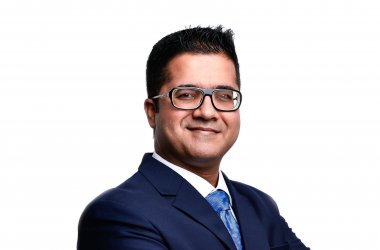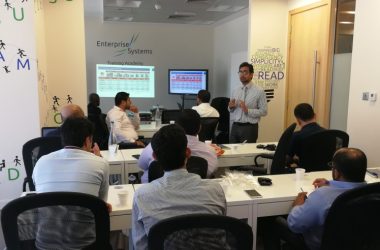 Growing competition and increasing regional demand for its services are making it bullish to cross over
Growing competition and increasing regional demand for its services are making it bullish to cross over
When Feras Al-Jabi, General Manager of Itqan received the Feigenbaum Leadership Excellence Award in early 2011, recognizing him as an accomplished leader, it was also recognition of how Itqan has repositioned itself to meet the demands of its customers.
The Abu Dhabi based systems integration company has been in operation since 1984. However it is only over the last ten years that it has started offering enterprise applications and solutions along with its traditional offering of hardware and infrastructure.
Being at the helm of the company since 1998, Al-Jabi has structured the company to foster close engagement with its public sector customers who have been with Itqan since its origin. Rather than migrate away to the multitude of other market opportunities in the UAE and GCC, Al-Jabi has chosen to offer newer and more varied technology solutions to this portfolio of long term customers. The approach has been to offer new solutions to existing clients rather than existing solutions to new clients.

Explaining this Al-Jabi says, “Maintaining long term relationships with them, is more healthier and profitable than to keep moving outside the markets we have developed”.
Itqan defines its primary customers as the government sector covering four areas of defence, education, healthcare and citizen centric departments. The last area includes service intensive departments with continuously scalable requirements and accountability built around the customer’s customer.
The oil and gas market segment was where Itqan historically started its business. Today this remains more of a supporting market after the government, rather than its primary market. While the telecom segment is an opportunity, ITQaan has not developed any specific solution or internal practice for this vertical. For this segment it offers its standard practice engagements.
Inbuilt in Itqan’s previous five year strategic planning is the continuing and primary focus towards the public sector. This is one of the reasons for Itqan’s long term stability in the region. Business expansion and growth of the sector, pro-technology governance, migration, integration and deployment of new technologies have contributed to return Itqan’s time and cost investment towards this segment.
Al-Jabi describes the return on investment from this sector as, “fair, enough and plenty”. And buzz words describing its strategic approach to this market as “focussed, responsive and nimble”.
Another possible reason for Itqan’s long term stability is the careful selection of technology platforms. Starting off with only a hardware infrastructure service, the company now has four mature practices that it can offer its public sector customers. The most recent solutions are built around Microsoft Dynamics ERP and CRM platform and Microsoft Sharepoint Portal. It also offers SAP and Oracle enterprise applications and implementation. However the return on investment focus is around Microsoft technologies and less on SAP and Oracle. Itqan selects the technologies based on business needs rather than the “latest and greatest solution” available.
Facing the market is the current umbrella of practices including hardware infrastructure, enterprise applications, business intelligence and scalable service support. “At any particular time, we come across lots of businesses which require at least two portfolio of offerings to be delivered at once”, says Al-Jabi. Most customer requirements are covered by these four practices.
Considering the high profile and critical nature of its public sector customers, the challenge for Itqan has been to manage their growing requirements using its established practices. Till recently, it has neither found the need to venture into a vast portfolio of technology offerings for each practice nor stretch itself out by developing business across adjacent geographical regions.
“Our structure has been simple and clear for years. Our strategy is our core market, core offering and partnership. We have planned our capacity in terms of these solutions without sacrificing quality of service, nor the reach”, says Al-Jabi.
But the rapid regional economic growth has also brought its share of foreign competitors with a different basket of strengths and solutions. One such bloc of competitors that continue to penetrate the local market is Indian system integrators. An important difference between Itqan and this bloc of players lies in the nature and origin of their growth.
Itqan originated as a hardware services company, and has gained expertise in application and software development over time. The Indian bloc have originated from the realm of software development and have built up application integration skills on multiple hardware platforms over time. Both appear to have the same goal but have progressed through different streams of work.
Another key differentiator is the vast factory of software developers available to any India based systems integrator. Perceiving this differentiator as a weakness Itqan has tied up with the India office of Capgemini to outsource software development on a need basis. Most of Itqan’s projects are now a hybrid of onsite and offshore services, also called mixed delivery, between the two partners. Specifically Itqan has left the SAP and Oracle development resources to its Indian partner as well as other complex projects. However, “CAPGemini is not involved in each and every transaction of Itqan”, clarifies Al-Jabi.
While the Indian system integrator bloc has relied extensively on the SEI certification model for software quality assurance, Itqan has used ISO standards to control internal quality till date. Historically ISO standards at Itqan are not a recent initiative and quality assurance is part of its internal day-to-day operations and work culture. Itqan’s ISO standards are also meant to gain the confidence of prospective customers. It has a trio of ISO certifications with the most recent being in May 2011. Considering its relationship with Capgemini, phasing in the SEI model is also part of the quality initiative target.
How do Indian system integrators view local players such as Itqan? They are rated high because of their deep and long term contractual engagements with the public sector. Any Indian system integrator wanting to enter this sector would probably be more successful through a joint bid with a local player. However for now Indian system integrators don’t view their local counterparts as a threat. MahindraSatyam’s, regional Vice President Manojeet Choudhury clarifies on the non competing nature of local and Indian system integrators. “The kind of projects they are doing, we are not there. And the kind of projects we are doing, they are not there”. The market is large enough for both types of players and everyone appears to have a distinct space to operate for now.
However those dynamics may change over the next five years. Internally Itqan has announced it wants to be the leading systems integrators player across the GCC in less than five years. It has pulled out its “regional player, acquisition game plan” shelved since 2008 when the global meltdown took place. As part of that plan it had earmarked acquisition of two regional players allowing it to advance outside UAE. Now it has decided to go down that route once again.
Within UAE it has already stretched itself to Al Ain and the western side of Abu Dhabi, entrenching itself within oil and gas and defence establishments. Now with foreign player competition building up in UAE, it is going to be a race on who sets up fastest across GCC. “We have tremendous pressure from certain customers in Saudi Arabia and Qatar to come over”, says Al-Jabi. Add to that vendor pressure from Itqan’s partners, who anticipate the UAE success story being replicated in other countries and it is not difficult to understand Al-Jabi’s bullish outlook to cross over.
However the road ahead is challenging and one of the formidable challenges is to build a large team to manage expansion across GCC. “Technology skills cannot be built overnight. It takes time and investment and has to be a long term strategy”, says Choudhury. Itqan will probably need to follow the same model that its Indian peers have done over the last two decades, perhaps replacing India for Egypt. If Itqan’s Al-Jabi pulls this off the next award five years from now will definitely be bigger than 2011’s Feigenbaum recognition.
===========================
Itqan’s four business practices
Knowledge Management
As the company repositioned itself in the local market from an infrastructure service provider to a solutions provider in the late nineties, this was one of the first practices to kick off. In the initial stages this included document management, imaging and archiving solutions. With the launch of Microsoft’s Share Point portal in 2002, the practice expanded to a full portfolio adding workflow, business process management and web based portals. Increasing competency in this practice has lead to the development of a product known as eDiwan, a trademark of Itqan, which is a middle ware connecting to back office legacy applications and single sign-on at the front end.
Recent customer: Abu Dhabi Educational Council (portal), Western Region Development Council (portal), Twofour54 (content management)
Application Implementation
This covers the deployment of ERP packaged solutions built around Oracle suite, SAP and Microsoft Dynamics and other solutions for healthcare and human resources. The domain expertise for the ERP applications is in the market segment of government and oil and gas. eKawader is a human resources and payroll application especially built for the regional market that sits on top of Microsoft Dynamics. For this enterprise portfolio of applications there is less effort on customization and more emphasis on the key features of the enterprise applications allowing easy upgradability.
Recent customers: Farah Leisure Parks, Gulf Allied Digital Media (partner with Sumtotal Systems), Sharjah Museums Department (eKawader), Securities and Commodities Authority (ERP)
Information Infrastructure
When the company started its business in 1984, this was its main forte and continues to this day to be its primary revenue earner. All components that sit below the application layer covering the operating system, networking, storage, virtualization, connectivity falls in this practice. As an active hardware player, Itqan has relationships with Dell, HP, Cisco, Huawei, EMC and Oracle-Sun. Years of competency in this area allow Itqan to roll out an integrated solution rather than multiple boxes at the time of implementation.
Recent customers: Maritime Industrial Services (unified platform based on Microsoft technologies), Mafraq Hospital (unified communication implementation), Ministry of Health (Al-Nabed datacenter)
Outsourcing
This covers additional resources deployed around customer infrastructure to help them manage their support functions including the help desk. The focus of the managed services is looking after the customer’s customer, rather than an inward focussed approach.
Recent customers: Panasonic (technical support)
===========================
Recent recognition and milestones
– 2000, Gulf Excellence Forum Award
– 2004, 2006 Microsoft Winning Customer Award
– 2005, 2006, Sheikh Khalifa Appreciation certificate
– 2006, The Best ICT Company: Arab Technology Awards
– 2007, The Best System Integrator: Arab Technology Awards
– 2008, Certified ISO 20000
– 2008, Microsoft Dynamics, President’s Club Winner
– 2009, Recognized at Microsoft Dynamics Worldwide Partner Conference
– 2011, Certified ISO 27001
===========================





